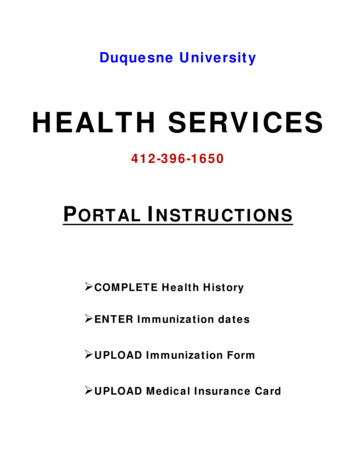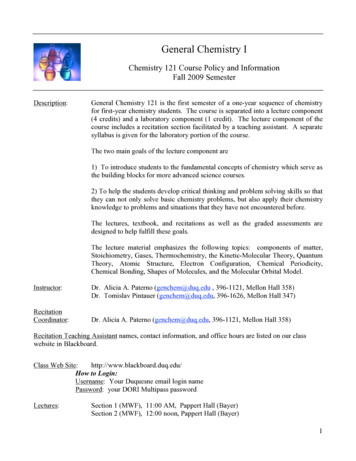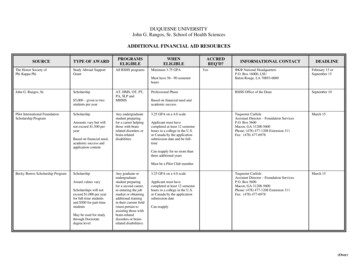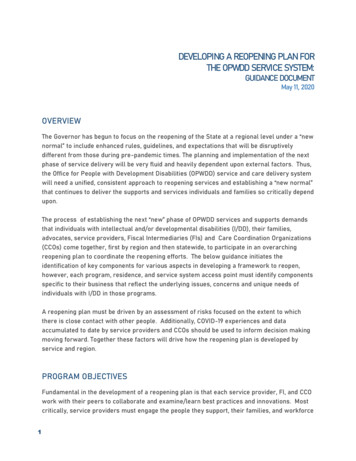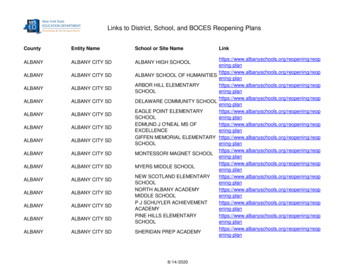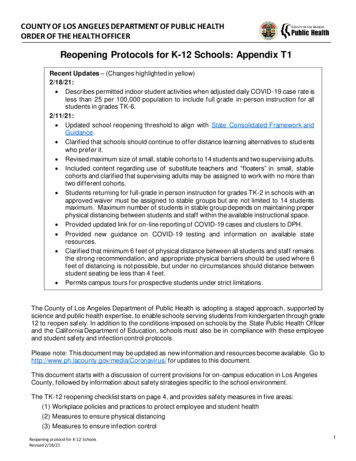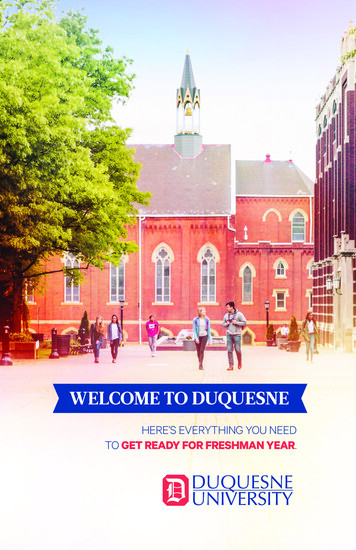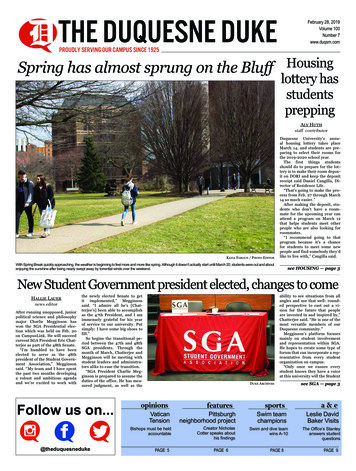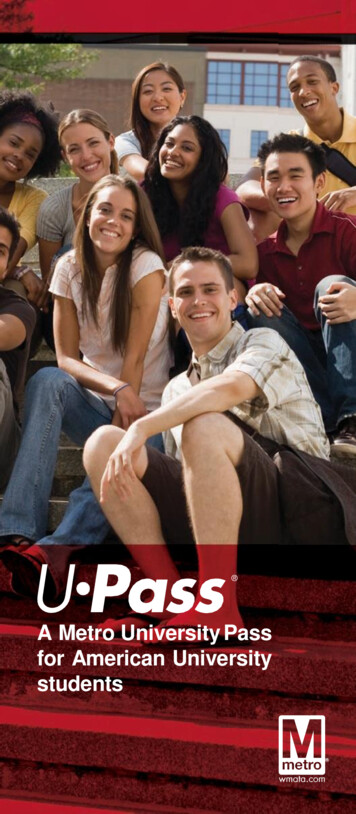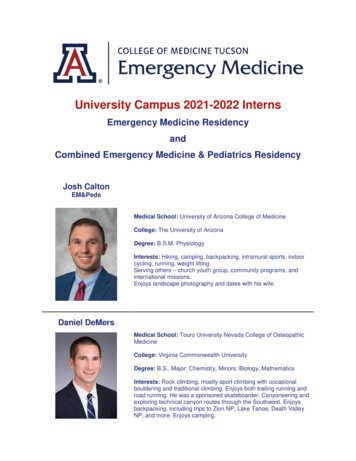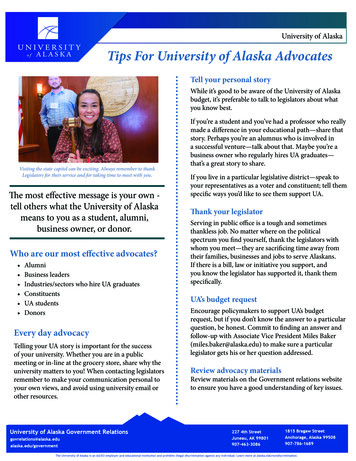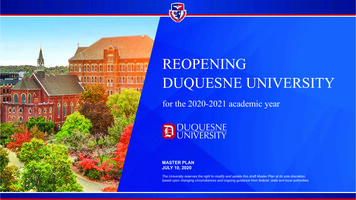
Transcription
REOPENINGDUQUESNE UNIVERSITYfor the 2020-2021 academic yearMASTER PLANJULY 10, 2020The University reserves the right to modify and update this draft Master Plan at its sole discretion,based upon changing circumstances and ongoing guidance from federal, state and local authorities
Table of ContentsGuiding Principles2Survey Results3Protect Duquesne Pledge5Section 1: People7Health Screening10Physical Distancing11Facemasks Required14Testing, Screening, Tracing 17Section 2: Places24Enhanced Cleaning26Classrooms31Residence Halls33Common Spaces35Dining and Food Venues36Parking and Shuttles37
“[W]hile your mind is tuned into the things of God, it shouldalso reason things out and act after mature reflection anddeliberation. Whenever possible, don’t act in matters ofimportance until you can see things clearly. Try to foresee,more or less, what the result will be before you decideanything. Leave nothing to chance, but once you havetaken every precaution, place your trust in God alone.”— Venerable Father Francis Libermann, C.S.Sp.—1—
Guiding PrinciplesDuquesne University’s plans and protocols for responding to theCOVID-19 pandemic are based on the following guiding principles: Safety—The foremost goal of the plan is to ensure the safety ofall staff, faculty students and campus visitors to the maximumextent possible. Mission—All aspects of the plan are centrally focused on themission of the university to serve God by serving our students. Continuity—A central focus of the plan is to ensure continuity ofoperations so that the activities of the university and studentprogress towards their degrees can continue with minimaldisruption. Flexibility—Given the fluid nature of the COVID-19 pandemic,the plan is designed to be flexible and responsive to change.—2—
Feedback and ParticipationDuquesne surveyed students and their parents,faculty, and staff members regarding theirpreferences in order to develop a plan for thefall that took their concerns into account. Thesurvey had significant participation. Otherdiscussions and meetings with different groupsresulted in more than 6,000 people providinginput on the University’s plans.On the most consequential decision—whetherto take measures to open campus safely withmodifications or to arrange for an entirely onlinesemester—all constituents aligned stronglyin favor of the University re-opening.—3—Individual Survey 300
Survey Participant Delivery PreferencesFully Online vs. Hybrid On-Campus OperationsSTAFFFACULTYPARENTSTUDENT0%10%20%FULLY ONLINE SEMESTER30%40%50%60%70%80%90%HYBRID MODEL TO RESUME ON-CAMPUS OPERATIONS—4—100%
Key is CommunityThe COVID-19 pandemicrequires the entire Duquesnecommunity to work together toensure the safety of everyperson in this community. Allmembers of the Duquesnecommunity who plan to returnto campus in the fall are askedto take a pledge to keepthemselves and others safe.—5—
Four PhasesPhase I: Preparations to Reopen: involving all of the activities necessary to gear theUniversity up to once again have students, faculty and staff on campus. This includes butis not limited to completing all physical alterations to campus (e.g., HyFlex modifications toclassrooms; adding plexiglass barriers to some work spaces; modifying the entry andexists to some buildings to improve foot traffic flow; significant signage and foot trafficguidance; additions of hand sanitation stations).Phase II: Initial Reopening: involving bringing a significant number of faculty, staff andstudents back to campus for the fall semester. This includes but is not limited to gettingemployees reacclimated to returning to work, moving students back into campus housing,initiating the official start of campus activities including orientation events and classes.Phase III: Sustained Reopening: involving maintaining all safety measures put in placeto keep the campus community safe. This includes but is not limited to completing theDaily Health Screen, limiting campus events and focusing on having academic life in amodified environment.Phase IV: Return to Normalcy: involving life at the university after a vaccine isdeveloped and the university returns to normal operations.—6—
People
Student Success and Continuity During the course of Duquesne’s traditional new-student orientation andAugust welcome week, dozens of returning sophomores, juniors and seniorswill serve as non-paid volunteers to mentor new students. A new studentmentoring program will be implemented to ensure that each incomingfreshman will have a student mentor. Multiple forms of communications will be used to inform students andparents about changes in services and procedures. The University willestablish segmented communications focused on particular areas. Duquesne will inform students of resources (videos, websites, etc.) availableto assist with remote learning and communicating with faculty and staff. Certain student and University services will staff beyond the traditional 8 a.m.to 5 p.m. timeframe. All in-person courses will incorporate hybrid learning.—8—
Student Success and Continuity The University’s traditional survey following FAST will inform finalplanning for new-student orientation. Orientation will adjust traditional schedules to permit physicaldistancing and reduce redundancy across orientation programming. Duquesne will offer additional move-in days for which families canpre-register, to spread move-in over a period of days. Offices that offer orientations for specific student populations(e.g., Commuter Services, ODI, the Center for Global Engagement)will extend collaborative programming into the semester. Faculty office hours will be expanded. Faculty will offer weekly “open chat” drop-in sessions to students. Duquesne will promote tutorials and resources available tofaculty and staff to implement enhanced online tools.—9—
Personal Responsibility for Collective GoodA Daily Health Screen is Required Must be completed by all individuals before they starttheir day on campus. A negative screen occurs when a person answers noto every question in the daily health screen. People witha negative screen are free to be present on campus. If a student has a positive screen prior to returning tocampus for the start of the semester, he or she mustcontact his or her primary care provider (PCP) ortreating physician for a consultation. If a student has apositive screen after returning to campus, he or sheshould contact Duquesne University Health Services(DUHS) by calling 412-396-1650 to receive instructionregarding appropriate next steps. Employees who have a positive screen should contacttheir PCP or treating physician for consultation.Employees should keep their supervisor apprised ifthese consultations require time away from work.— 10 —To ensure compliance with privacy laws, the results of dailyhealth screens should be maintained by individuals ratherthan by programs, departments or units.
Physical Distancing and PPE All students will be provided with training on COVID-19 complianceprotocols, guidelines, personal responsibilities and proper PPE use.Resident students will be provided with training from residentdirectors and assistants on COVID-19 compliance protocols,guidelines, personal responsibilities and proper PPE use. All employees will be provided with training describing COVID-19compliance protocols, guidelines, personal responsibilities andproper PPE use. All individuals who are physically present on campus will be asked topractice physical distancing as part of their dailyroutine. Individuals are encouraged to limit on-campus gatheringsoutside of the classroom to those that are absolutely necessary.Individuals are also discouraged from attending crowded places ormass gatherings. Individuals who do not comply with physical distancingguidelines can be asked to leave campus.— 11 —
Student Conduct The Student Code of Conduct and Residence Life Handbookwill have a COVID-19 addendum related to compliance withCOVID-19 conduct standards. All resident students will be provided with comprehensiveorientation and training to familiarize them with allexpectations, responsibilities and consequences of violations. The addendum will refer students to COVID-19 health andsafety expectations, identify prohibited actions, and discussadaptations of the student conduct process with respect toCOVID-19. Students will be required to review the addendum as part oftheir pre-return questionnaire.— 12 —
Physical Distancing and PPE Personal Protective Equipment (PPE)and other supplies to mitigate risk—including hand sanitizer, disinfectant wipesand cleaning products to sanitizesurfaces—will be procured centrally. Employees will receive initial supplies andadditions as necessary. The University will coordinate to provideresident and commuter students withsupplies. Campus visitors will be required to selfsupply or have supplies provided by theinviting department.— 13 —
Campus Presence and ActivityCloth masks or disposable masks must be worn by all individualsin all public settings on campus whether they are indoors or outdoors.These public settings include, but are not limited to: Academic Walk and all campus sidewalks Campus libraries Student Union Power Center Break rooms and lounges Classrooms Meeting rooms Hallways, stairwells and elevators Restrooms— 14 —
Student Activities The Center for Community Engaged Teaching and Research will support facultyengaged in community engaged teaching and scholarship. Communityengaged learning experiences will utilize online options for meeting andcollaboration, where possible. Students will receive clear instructions regarding protocols for work in labs. External placements including internships, externships and practicums willbe provided consistent with state and county regulations, accreditationrequirements and external partners. Student clubs and academic activities programming will prioritize opportunitiesfor student leadership and development. Programs will be offered onlinewhenever possible and will utilize social distancing, if necessary. Student Life offices including the Office of Freshman Development,Residence Life, the Commuter Assistant program and the Office ofDiversity and Inclusion will continue to offer online programming as well asface-to-face programming consistent with current health and safety guidelines.— 15 —
Student Activities (continued) Events and activities should occur on campus. Whereverpossible, external guests should participate virtually. The Office of Diversity and Inclusion will implement plansfor outreach, including virtual office hours, virtual forums andminority student surveys prior to FAST 2020. Fraternity- and sorority-sponsored events will either bepostponed or reevaluated depending on whether the eventcan be modified to occur remotely or virtually. Study abroad programs will be cancelled for the fall2020 semester. Rome and Dublin campuses will prepare fora return of students in spring 2021. International students will be accepted on campus if theyare able to secure appropriate visas.— 16 —
Testing, Screening, TracingIf Duquesne has a confirmed case or cases of COVID-19, DUHS will initiate contact tracing. Tracing will determine close University-affiliated contacts, defined as any individual who waswithin 6 feet of an infected person for at least 15 minutes. Allegheny County Health Department (ACHD) will be notified directly of the students, staff andemployees with whom the infected person had contact, to the fullest extent possible. ACHD willpursue notification of those individuals who are not University affiliates. Whether completed by ACHD or Duquesne, contact tracing of students will begin byinterviewing the confirmed case using structured survey questions to identify close contactswho may have been exposed. Potentially exposed individuals will receive daily surveysdetermine a need for testing. Depending on the nature and timing of potential exposure, close contacts of confirmed caseswho are members of the Duquesne community may be asked to quarantine and self-monitor.Employees will be asked to do this at home. Students may be asked to quarantine indesignated University facilities operated under quarantine and isolation protocols.— 17 —
Testing Options for Students— 18 —
Campus Presence and Activity Vice presidents and deans will determine oncampus staffing requirements, sequencing androtation schedules, where appropriate. Onlyemployees whose work necessitates a campuspresence will return to campus. All spaces will support physical distancing andhygiene/cleaning protocols. Vice presidents and deans, in consultationwith directors and department chairs, willdetermine faculty and staff for whom an oncampus presence is necessary, whether on arotational or daily basis, and amendschedules as appropriate to adhere to socialdistancing requirements. When guidance from government and healthcare leaders indicates an appropriate controlof transmission and/or the availability ofwidespread vaccines, vice presidents anddeans will determine the resumption of oncampus operations for all employees. The first wave of select employees to return tocampus will begin the week of July 6, 2020. Employees faced with unique challenges willconsult supervisors and/or the Office of HumanResources. The next group of employees will return to campusin early August 2020.— 19 —
Vulnerable PopulationsThe University is implementing a variety ofmodifications to classrooms, work schedules,workspaces and instructional modalities, aswell as cleaning protocols throughout campus,to enhance health and safety conditions for allemployees. In cases of employees whomay have an underlying condition, theUniversity will be as flexible as possible inaddressing return to work issues andaccommodations, as needed.— 20 —
Reasonable Accommod
10.07.2020 · The University reserves the right to modify and update this draft Master Plan at its sole discretion, based upon changing circumstances and ongoing guidance from
